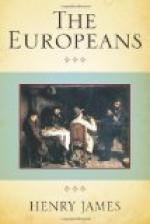It pleased Gertrude even more to think that he was an amateur than to think that he was an artist; the former word, to her fancy, had an even subtler connotation. She knew, however, that it was a word to use more soberly. Mr. Wentworth used it freely; for though he had not been exactly familiar with it, he found it convenient as a help toward classifying Felix, who, as a young man extremely clever and active and apparently respectable and yet not engaged in any recognized business, was an importunate anomaly. Of course the Baroness and her brother—she was always spoken of first—were a welcome topic of conversation between Mr. Wentworth and his daughters and their occasional visitors.
“And the young man, your nephew, what is his profession?” asked an old gentleman—Mr. Broderip, of Salem—who had been Mr. Wentworth’s classmate at Harvard College in the year 1809, and who came into his office in Devonshire Street. (Mr. Wentworth, in his later years, used to go but three times a week to his office, where he had a large amount of highly confidential trust-business to transact.)
“Well, he ’s an amateur,” said Felix’s uncle, with folded hands, and with a certain satisfaction in being able to say it. And Mr. Broderip had gone back to Salem with a feeling that this was probably a “European” expression for a broker or a grain exporter.
“I should like to do your head, sir,” said Felix to his uncle one evening, before them all—Mr. Brand and Robert Acton being also present. “I think I should make a very fine thing of it. It ’s an interesting head; it ’s very mediaeval.”




